Honey oatmeal soap bars made with a melt and pour soap base are perfect for dry, sensitive skin. The simple step of adding honey and oatmeal in what would be an otherwise ordinary bar now becomes an exfoliating soap bar that smells amazing.
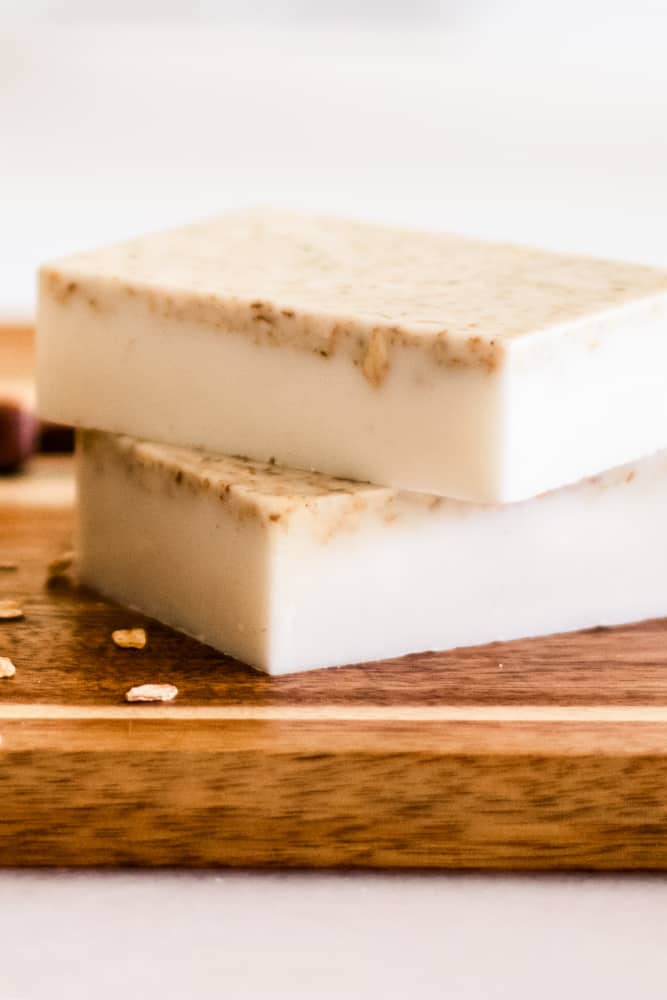
As much as I am a DIYer, there are times when I like to keep it simple—like real simple. So if you are looking for a simple soap bar recipe, try making melt and pour soap bars.
I do love making cold-process soap bars too, I can choose the exact fat and oil combination base, but sometimes, especially during the holiday season, I’ll make melt and pour soap base because it is much easier!
Cold process soap for those that don’t know is soap making from scratch-the lye, the water, the fats and oils, all will have to be measured out and care must be taken when dealing with the lye. Whereas with a melt and pour soap bar, that step has been completed so that even my 8-year-old can help!
I love that melt and pour soap bars are so easy to make and the scents and decorative additions can be entirely customized. You can choose what kind of soap base you want to use, what scent you want to make, and choose what you want to add in. We will be using oatmeal to make a skin exfoliating soap for this recipe.
Oatmeal and Honey Soap Recipe
Oatmeal has so many great benefits for the skin; it is used in milk baths and can help with many skin irritations. You can use quick oats, colloidal oatmeal, or powder oatmeal. Powder oatmeal can be made by blending oatmeal in a high-speed blender.
We’ll be using powder oatmeal for this recipe, which I made by blending regular rolled oats. Oatmeal has been used to soothe dry, itchy skin and skin rashes for many years.
Adding oatmeal to your soap bar is a great way to gently exfoliate the skin and remove dead skin cells.
Melt and Pour Soap Recipes
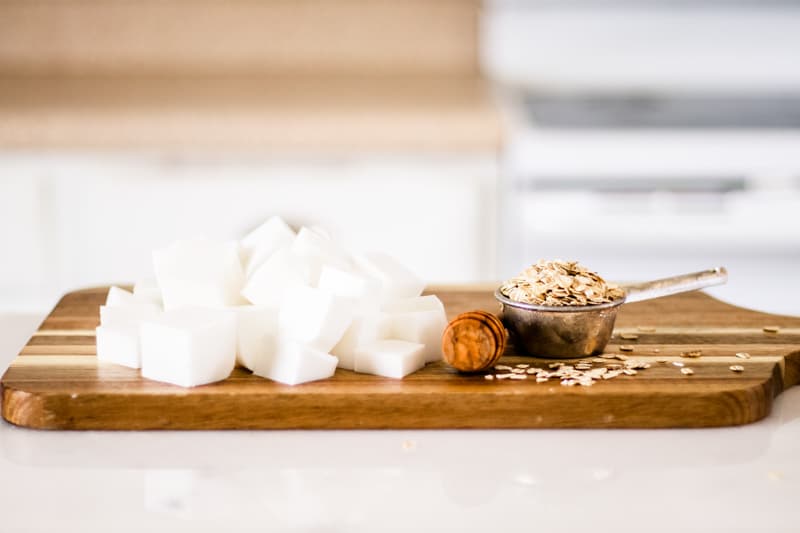
To make a melt and pour soap bar, the first step is to choose a soap base. Shea butter is one of my all-time favorites to use, and it makes a beautiful creamy soap bar that lathers nicely.
Shea butter can soften, hydrate, and protect the skin against environmental threats, making it a perfect base for our honey oatmeal soap recipe.
I use this same shea butter base in my pumpkin spice bars.
This post contains affiliate links, which means I make a small commission at no extra cost to you. Get my full disclosure HERE.
Other melt and pour soap options are:
Organic oil clear glycerin soap base
Goats milk melt and pour soap base
Coconut milk melt and pour soap base
Choosing your soap base will depend largely on your preference and skin type. However, the rest of the recipe will stay the same no matter which base you choose to use.
NOTE: Choosing a clear glycerin base will change the look of the soap. If you want the soap to look like the pictures in this post, I would suggest using shea butter, coconut milk, or a goat milk soap base.
How to Make Soap without Lye
Lye is the ingredient that scares most people away from making soap. However, it is a crucial ingredient in soap making and what turns oils and fats into soap; this process is called saponification.
Lye can be dangerous to work with, and if you choose to make a cold-process soap bar, you will need to follow some safety precautions.
However, if you are wanting to make soap without mixing the lye yourself, a melt and pour soap base is the way to go. This is because melt and pour bases have already gone through the saponification process, and no lye is required.
Honey Oatmeal Soap Recipe Melt and Pour
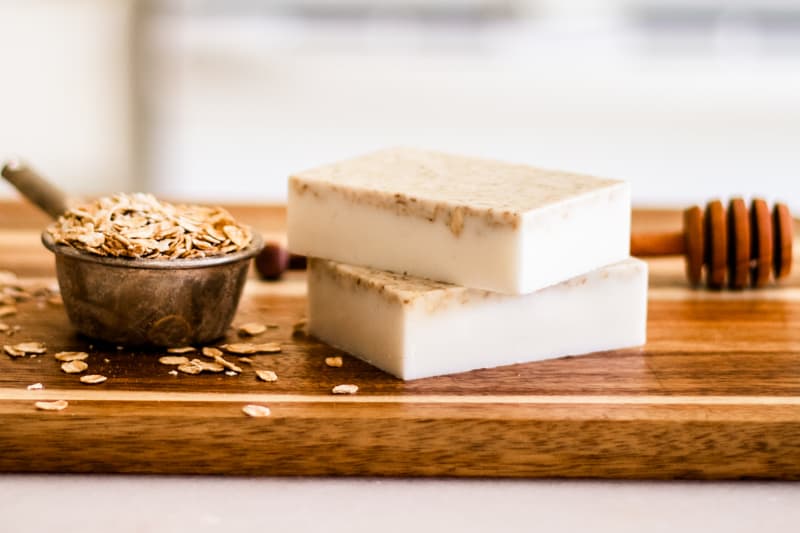
INGREDIENTS
- 1 pound shea butter soap base
- 1/4 cup oatmeal (I use regular rolled oats, blended)
- 2 teaspoons honey
- 40 drops lavender essential oil
- Silicone soap mold
INSTRUCTIONS
Cut the shea butter soap base into small chunks and place them into a double boiler.
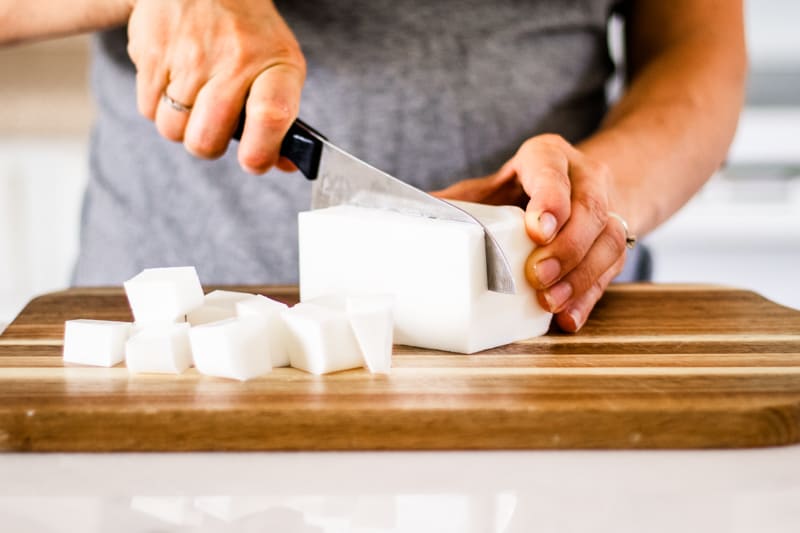
Melt over medium heat. Stir occasionally with a wooden spoon.
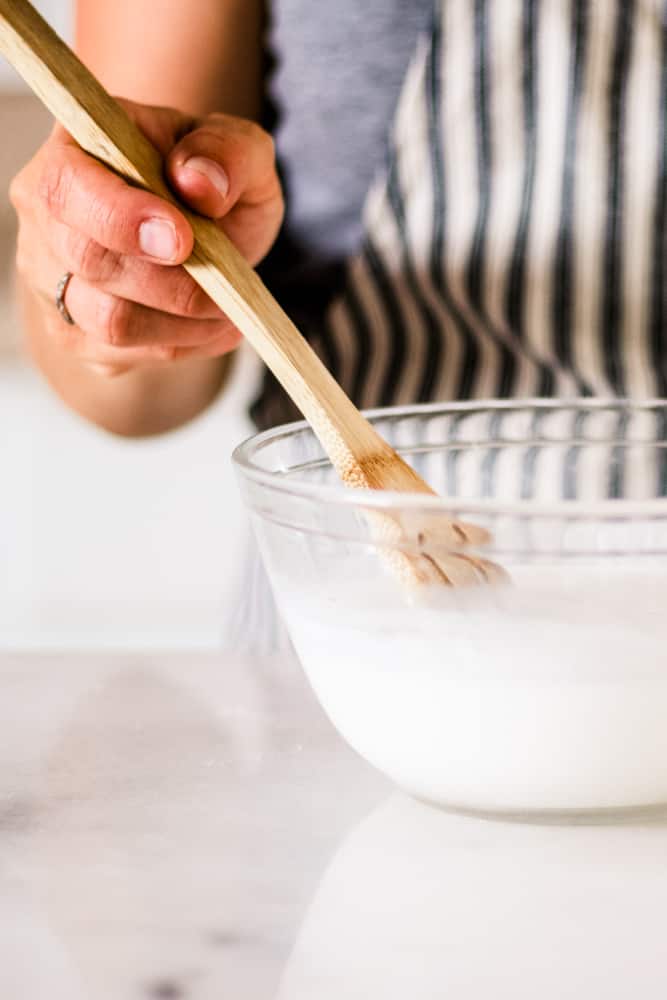
Remove from heat when it is completely melted.
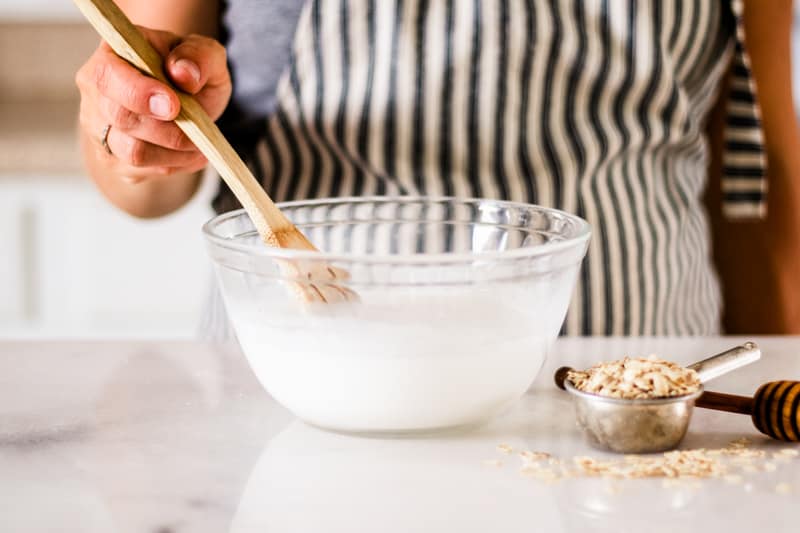
Add in oatmeal, honey, and lavender essential oil. Stir to mix.
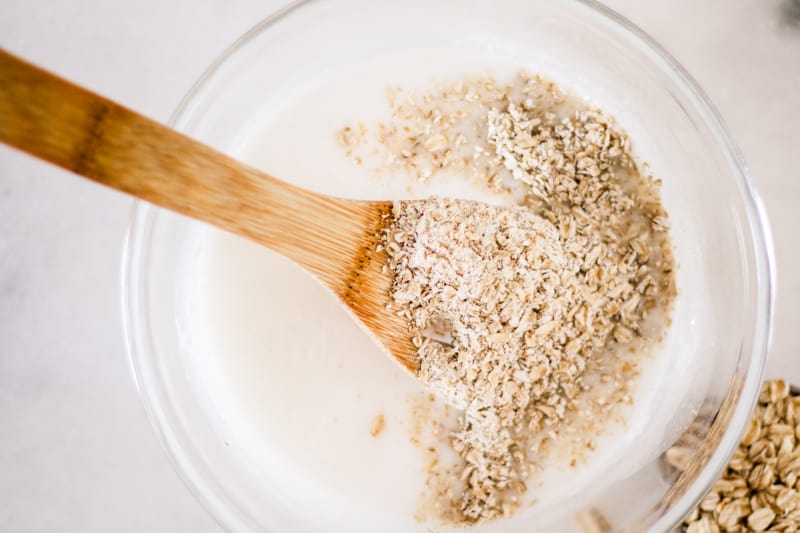
Pour into the soap molds.
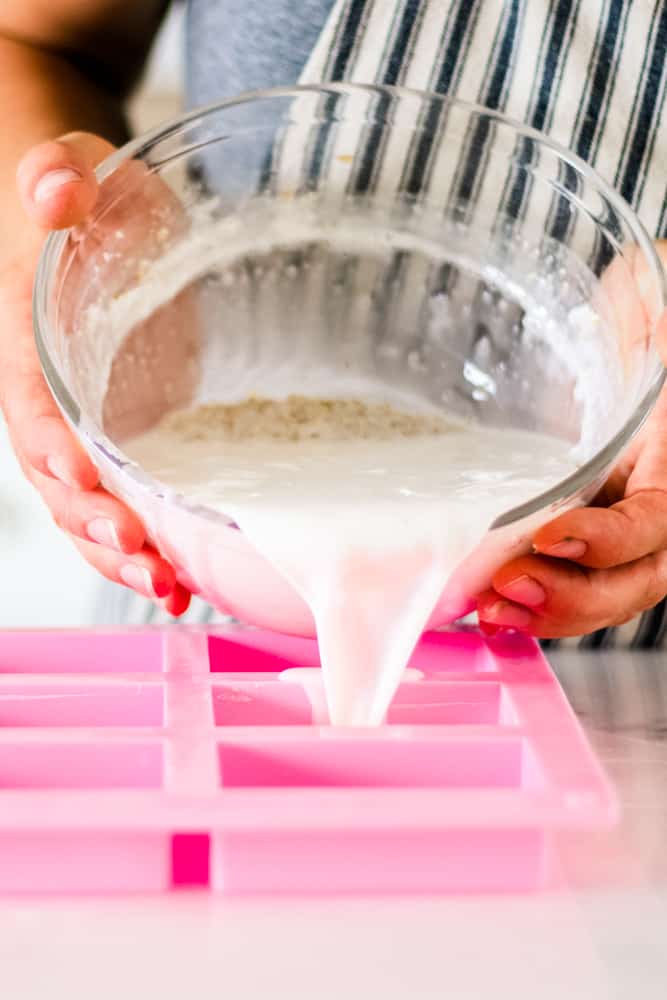
Allow it to harden completely, and then pop the soap out of the mold.
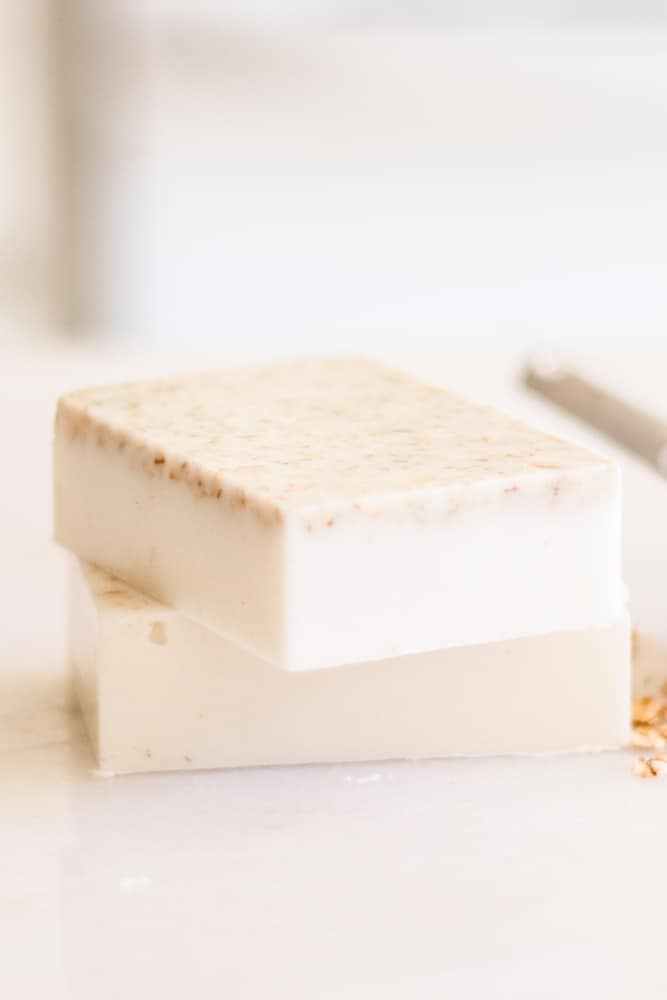
Washing with Honey
I have added honey to hair masks, body wash, skin salves, and a lot of other skincare DIY’s. The most common question I get is if it makes the skin sticky.
Surprisingly, the answer is no! Since you are using this soap in the shower to cleanse the skin and then rinse it off, you won’t notice any residue on the skin.
Honey has many benefits, including antibacterial and antiviral properties that can help balance bacteria on the skin. In addition, the added honey will naturally cleanse the skin, making it an effective soap bar.
Washing with Oatmeal
Oatmeal is the other key component of this soap that makes it better than a typical soap bar. Adding oatmeal will make this soap bar exfoliating and helpful for skin irritations.
I make several exfoliating soap bars, including a deliciously smelling coffee soap for gentle exfoliating and a beautiful loofah soap to clean and exfoliate the tougher areas of the skin.
Oatmeal is cleansing and can absorb dirt, oil, and odor. It can be beneficial for both dry and oily skin. Oatmeal is suitable for almost all skin types.
Is All Soap Antibacterial?
In short, no. Many soaps that you make or buy can be made without antibacterial properties. This isn’t all bad, as we tend to overuse antibacterial products. Although antibacterial products are fine, not every product has to be antibacterial.
Our bodies need bacteria to stay healthy, and the overuse of antibacterial soaps, wipes, even lotions can negatively affect our immune systems and may deplete our bodies of necessary bacteria.
Using natural antibacterial products such as honey or coconut oil will destroy the “bad bacteria” while preserving “good bacteria.” It will still clean and cleanse the skin without causing any harm.
Christmas Soap Ideas
With Christmas just around the corner, of course, I am thinking about homemade Christmas gift ideas! This homemade soap bar will make the perfect addition to any gift basket or stocking stuffer.
With the cooler months upon us, making a honey and an oatmeal soap bar would be perfect! These ingredients can help relieve dry, itchy skin often caused by colder weather.
Soap bars are one of the best Christmas gifts because they are practical and something everyone will use!
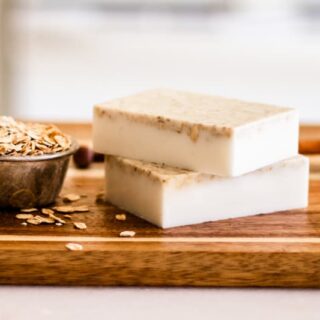
Honey Oatmeal Soap Recipe
Equipment
- Double Boiler
- Wooden Spoon
Ingredients
- 1 pound shea butter soap base
- ¼ cup oatmeal blended
- 2 teaspoons honey
- 40 drops lavender essential oil
- Silicone soap mold
Instructions
- Cut the shea butter soap base into small chunks and place them into a double boiler.
- Melt over medium heat, occasionally stirring with a wooden spoon.
- Once melted, remove from heat.
- Stir in oatmeal, honey, and lavender.
- Transfer to soap molds.
- Allow it to harden completely, and then pop the soap out of the mold.
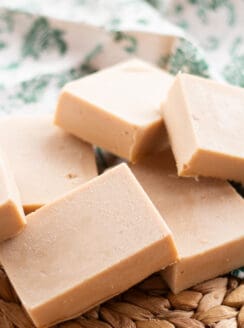
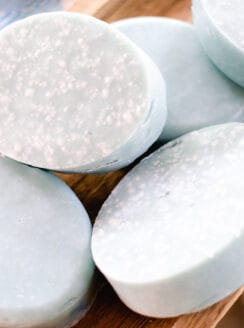
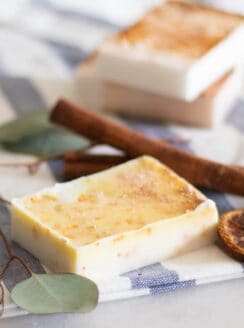
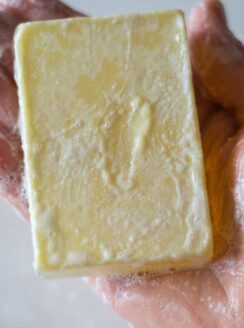
Stephani says
I love this! It seems all my oatmeal has sunk to the bottom. I’m wondering if I stirred i. The oatmeal to soon. What temperature do you wait until you stir in the oatmeal ?
Laura says
So glad to hear you loved it! The oatmeal sinking to the bottom is actually completely natural – you can even see it in the pictures, just settling on the underside of the bars. If you’d like the oatmeal more evenly distributed throughout, just wait for the melted soap to thicken up a bit before stirring it in!
Deb says
Hello,
The oatmeal recipe… how many bars does that yield please.
Laura says
Approximately 6 bars
Elizabeth Moran says
Is there a specific way to store the soap, I would be making a whole batch for my husband but he only goes through one soap bar once a month.
Laura says
I just store my soap bars in a basket in the closet.
Andra says
Can I add more honey? If so what would say the maximum amount I can add is? Thank you Love your blog and youtube!!!
Monika says
Dear Laura
Thanks indeed for your recipes!
I’ve tried this one but unfortunately my soap didn’t get hard. Has this happened to you too? I can only imagine it’s because of the shea butter, mine is cold pressed…
Hugs,
Monika
Laura says
You’re welcome! Did you use a shea butter melt and pour soap base? This recipe is for melt and pour soap, so you will need a base for this recipe.
Cindy says
Could you do a recipe with honey for cold process soap? Or is it possible to make the portion of premade melt homemade?
Erica says
How do you remove the skin that forms after spraying the soap with alcohol? I used a toothpick before the soap was hardened, but it leaves a rough surface as a result.
jennifer Uzele says
It is people like you who make this world a wonderful place. Be encouraged, you have made me relaxed as I tried some of your recipes. I just wanted to do something off the wall -you know coming out of all the stressfull works that I do- i mean…Thank you for working so hard and providing this wonderful service which is so easy and joyful to follow
Jennifer
Laura says
Thank you so much!
Mar says
Thank you for all those easy recipes.
I love to wash my body and face with natural products.
With gratitude,
Mar
debi monte says
Hi, I’m making this oatmeal soap for a teen who has psoriasis on his face.
Should I still add the lavender drops.?
I also use doterra, what do you suggest.?
Thank you
love you recipes
Laura says
I find lavender to be helpful for that.
Sandra Shacklock says
Sound wonderful. I cant wait to try some of these recipies
Thankk you
Lucinea Teixeira says
Hi. I used the coconut milk melt and pour soap base. I think it made may skin too dry. Can I add some coconut oil to the mix before pour in the mold.
Laura says
Yes, you can but I wouldn’t add too much. You can also do a little jojoba oil.
Bonnie Smith says
This recipe looks wonderful. Approximately how many bars do you get from one recipe? Thank you for sharing with us!!!
Laura says
About 6 bars
Jody A Wood says
What do you wrap the soaps in to sell or gift
Terri says
Hi this is something new for me but I’m trying to find things to help keep me busy. So thank you for sharing.